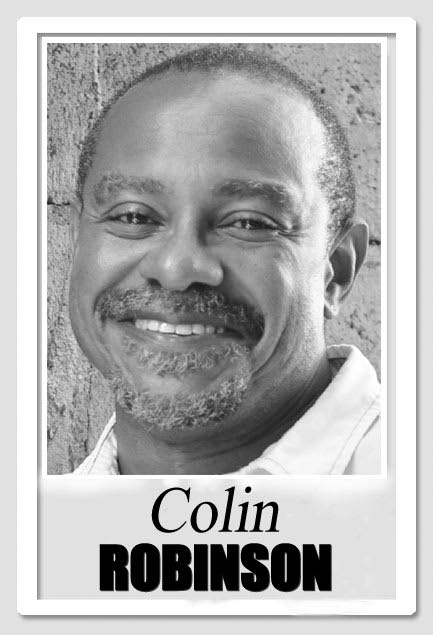Launching an immoral vision of crime

Colin Robinson
A “momentous occasion,” the young caller seeking my RSVP, on hearing my ambivalence, described it. Precisely why I was loath to go.
The Government’s National Crime Prevention Programme (NCPP) wasn’t launched in Embacadere or Enterprise, Cedros or Covigne, Beetham or Brooklyn. But at the Hilton.
I did go. But neither the Prime Minister himself, nor the Chaguanas Mayor, both scheduled to speak, showed. Nor any Opposition MP. Playing politics with crime, jeered Stuart Young, minister of many things; I guess he wasn’t, in pointing it out.
As anticipated, it was long on pappyshow. Painfully so.
To a drumroll, curtains were drawn unveiling an amateurish five-handed logo—the bottom two represent government, we were instructed. “Like Government shrugging,” suggested someone in my section in the rear—“Local Celebrities, Cultural Artistes, Youth”—including Olympic champion Hasely Crawford and actress Penny Spencer. Umi Marcano performed the impossible-to-sing-along NCPP themesong, over a voice track. A promotional video featured a Yankee-accented narrator, and advocated a “bottoms up” approach. Every speaker reprised the protocol of each officeholder’s name and title (including Young’s 13-word one), in slightly different order; one addressed the diplomatic “corpse.” Speeches dripped with buzzwords: Collaboration, Empowerment, Action; “Whole-of-Government” predominated. Rows of MILAT and Civilian Conservation Corps uniforms warmed chairs. A Corps graduate soloed about Jesus.
My point isn’t how easy these things are to smugly lampoon. It’s how seriously they were all taken. Instead of the fundamentals.
Besides the themesong’s lyrics, only a green pen was handed out. (In my section at least.) There was no weblink on it.
Opening his sweep through a sea of jargon-laced prepared remarks, national security minister Dillon prattled off: “It saddens me deeply to hear the loss of life.” He muttered a list of admittedly “reactive” and “tactical” initiatives to improve crime prediction, deterrence, detection, prosecution and rehabilitation. The more intriguing ones, like prison intelligence-gathering, were attributed in media reports to NCPP. As was the local government minister’s account of a promised six-fold increase from the current 255 municipal police officers, whom he imagined being “invited to homes to speak to young people.”
Just what NCPP was was never clear, though. In my section, we reassured successive latecomers: No, they hadn’t missed the big details of this “credible platform to operationalise a whole-of-government strategic policy for good governance and excellence in service delivery” in a way that “will be sustained in the long term” and “implemented on a phased basis”—this “crucial and wholistic national programme” that would “herald the beginning of a new era of development and stability…promoting and facilitating good order,” as Dillon’s script read.
But we did know it would “utilise existing resources.”
Well, there is a website: www.ncpp.gov.tt where you can watch a horribly recorded video of the launch. Go listen to the minister yourself: www.youtube.com/watch?v=35e_SMFxEz4. And a Facebook page: facebook.com/ncpptnt.
There isn’t much to NCPP: it’s a community council in each local government area (14 in Trinidad, one in Tobago) that’s a forum to channel citizen concerns about crime; plus community liaison officers to convey feedback from authorities; and a supporting secretariat. It’s being piloted by the Diego Martin and Chaguanas corporations and THA. You can volunteer on the website. I did.
There was no big reveal Wednesday. Though something was extraordinarily revealing about the launch. No, not Government’s confidence they can hoodwink us and media with fluff. Though no parents rushed the headtable clutching pictures of their gunned-down children.
What was “a very defining moment for us in TT,” to quote Dillon, was Government’s poverty of vision about criminology. When Keith Rowley responds to constituents’ devastation and pleas for community initiatives by labelling crime a decision or product of bad parenting, it isn’t just a weary old Black Tobagonian who strove into middle-class respectability. It’s a Cabinet philosophy. And it was launched Wednesday.
It doesn’t understand crime as having economic or sociological origins we need to address upstream. It sees crime as bad-mind. As immorality. Like women and domestic violence: as a poor choice. Except nobody was pulling anybody’s coat; 11 ministers were there, clapping.
That’s why NCPP is so simple. Launch rhetoric repeatedly hinged on good citizens putting “all differences aside” to “unite in partnership” with government to “reclaim our beautiful country” from the bad ones. Restore quality of life. Get rid of “elements making us not look good.” Deter those “considering nefarious activities.”
No social justice interventions. No economic incentives. No fixing educational inequality or irrelevance. No attention to working families’ needs. No law reform. No mental health services. Nothing vaguely recognisable as “proactive measures to effectively address and remedy the social roots of crime” one speaker promised would be unveiled. “Crime is a battle—almost a war,” Dillon trumpeted.
“A minority of our citizens are law-abiding and right-thinking,” he also said. Accidentally. If only we began there—acknowledging our bandits as thoroughly homegrown.


Comments
"Launching an immoral vision of crime"